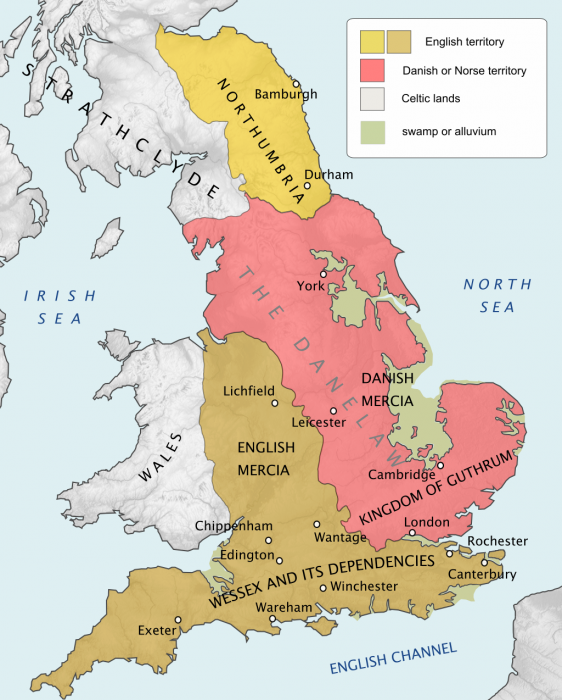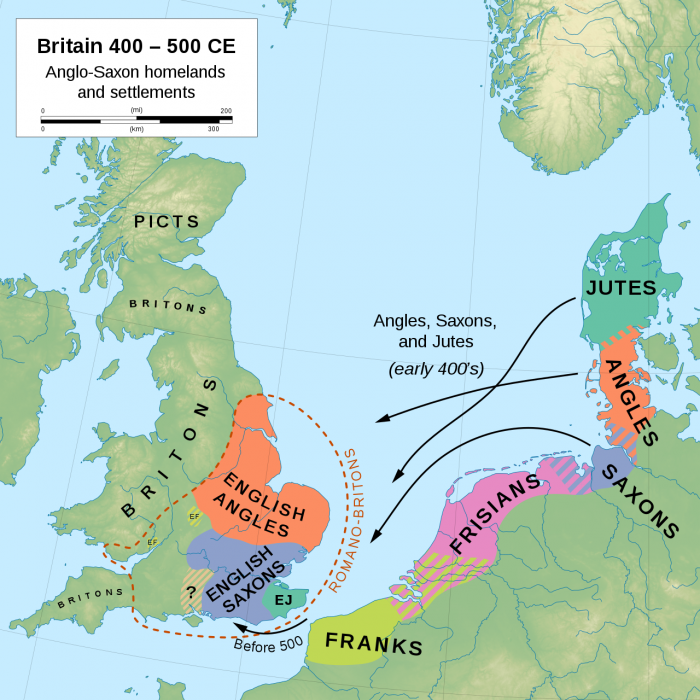At Least They're Honest
Another thing to keep in mind is that the migration of languages and the migration of genetically related people don't always align. And cultural identity, eg how people group themselves, what they call themselves, and how that is or is not continuous over time, doesn't always align with these either.
PVW said:
Another thing to keep in mind is that the migration of languages and the migration of genetically related people don't always align. And cultural identity, eg how people group themselves, what they call themselves, and how that is or is not continuous over time, doesn't always align with these either.
I'll walk back the genetic portion of my earlier post.
ridski said:
I'll walk back the genetic portion of my earlier post.
I don't think it's a question of "walking back," just meant it as a general reminder for all of us to keep in mind. "Who are the {group}
Here's an example to get at what I'm talking about -- how do we think about the people of precontact America vs how we talk about European history? We often see the term "native American" or "indigenous" which isn't wrong exactly, but does erase the incredible amount of cultural, linguistic, and political diversity of the continent(s) (there's an aside -- is it one American continent, or a north and south continent? Answers vary...).
I like the Canadian term "first nations" for that reason. If we can talk about Romans and Celts and Britons and Magyars, then probably it doesn't make much sense to group everyone from the Lennape to the Snohomish as generically "native American." And going the opposite direction, and closer to the topic of this thread, talk about "Anglo Saxon" American identity is clearly utter b.s.
I believe we're over thinking it all. This article from Sarah Churchwell is very informative.
PVW said:
I don't think it's a question of "walking back," just meant it as a general reminder for all of us to keep in mind. "Who are the {group}
" can be answered in lots of different ways -- linguistically, genetically, culturally. If there's any broader argument I'm implicitly making it's this -- the one absolutely incorrect way to answer that question is the nationalist one that believes there is actually such a thing as a well defined, historically consistent "nation", especially in anything approaching a sense of "purity."
Yes, but I really didn't mean to say that about genetics, as it was more about general ethnicity I think and I worded my thought poorly. So I am walking that back, because it's not really what I meant to say and doesn't further this convo anyway.
ridski said:
One thing about Oppenheimer's conclusions is that it actually doesn't negate what we know about Celts.
The Celts are a cultural group who migrated from the north west of India, across Europe, and into Ireland and Britain. The name comes from Hecataeus of Miletus, in 517 BCE, who called them Keltoi. The Romans referred to them as Gauls in northern Italy and France, but Julius Caesar notes that the Gauls called themselves in Celts in their own language. They were one of the dominant groups in central and southern Europe in the time before the rise of the Roman Empire. And yes, they would have lived in Basque country, too.
So genetically, Celts were different from northern Germanic Europeans. Also linguistically. Their languages still exist in modern forms as Welsh, Irish Gaelic, Scots Gaelic, Cornish, and Breton, and many of the root words of the original Brythonic and Goidelic languages can be traced to Sanskrit. What is weird, though, is that if us Celts did descend from Basques, there's no linguistic connection between Basque language and Celtic languages, so who knows?
I did read in a couple of now-outdated books about Celtic Britain and Ireland (The Celtic Realms and Pagan Celtic Britain), that there are quite a few books written by Irish and Welsh monks in the 11th and 12 centuries which attempt to marry tradition Celtic mythology and folk tales with Christian stories (similar to what Geoffrey of Monmouth and Chretien de Troyes did with Arthurian tales). The Book of Leinster is one such example, and the Mabinogion in Wales. But there's an interesting section of a book called (in English) The Book of Invasions, which is part myth and part fantasy, but is supposed to chronicle the various settlings or invasions of Ireland. In it, the sixth and final invasion is by the Milesians, who come to Ireland from Iberia. And while most historians consider the story bunk, it actually supports Oppenheimer's theory quite nicely. The timing and all the other stuff about tracing Goidelic back to the Tower of Babel story is probably nonsense, but there's no reason why we should discount the British Isles being settled by 2 seperate groups of Celtic peoples, with the island of Britain settled by the Brythonic- and Ireland settled by Goidelic-speaking peoples.
I like this. Never associated the Gauls with the Celts. I have always been interested in the migration of the tribes and the culture of this period in history.
Interested as well as I've been trying to trace my grandmother's ancestry which my aunt and cousin traced when they joined the DAR. Digging around the last name had 3 different spellings and it left me believing they originally came from Wales maybe coming across through Holland. Wondering if those DNA tests are reliable.
In an earlier post you mention the Danes. Were they the Jutes? Just remembering reading about the Angles, Saxons and Jutes probably in high school.
My apologies, i was going from memory there, and got my dark ages mixed up. I did mean Jutes. Danes and Jutes were separate at that time, despite Jutland now being a part of Denmark. Jutes, Angles, Frisians and Saxons had the same language group and colonized southern England. The Danes were northern Germanic and colonized the north east of England about 300 years later. Jutes founded the early kingdom of Kent, which was quickly assimilated into Wessex.
ridski said:
My apologies, i was going from memory there, and got my dark ages mixed up. I did mean Jutes. Danes and Jutes were separate at that time, despite Jutland now being a part of Denmark. Jutes, Angles, Frisians and Saxons had the same language group and colonized southern England. The Danes were northern Germanic and colonized the north east of England about 300 years later. Jutes founded the early kingdom of Kent, which was quickly assimilated into Wessex.
And I see the Picts are labeled on the bottom map, eventually to become the Scots, correct? We may need a Medieval History thread.
Morganna said:
And I see the Picts are labeled on the bottom map, eventually to become the Scots, correct? We may need a Medieval History thread.
Yes eventually. Scots were an Irish Celtic tribe who overran and assimilated the Picts.
And with that, I'll yield back the value of my time.
This has evolved from a horrifying thread into something much more interesting.
(says the lurker)
For those of you who never heard of Harry Golden:
https://en.wikipedia.org/wiki/Harry_Golden
He once said:
"While Anglo-Saxons were still roaming the forests of Great Britain, painting their bodies blue and eating wild strawberries, the Jews already had diabetes."
For Sale
-
REVO luggage $100
More info
Free Items
Rentals
-
Huge Brand New construction Apartment in 2 family home with 4 bedrooms 3 bathrooms
4 Bd | 3Full Ba
$4,500





















One thing about Oppenheimer's conclusions is that it actually doesn't negate what we know about Celts.
The Celts are a cultural group who migrated from the north west of India, across Europe, and into Ireland and Britain. The name comes from Hecataeus of Miletus, in 517 BCE, who called them Keltoi. The Romans referred to them as Gauls in northern Italy and France, but Julius Caesar notes that the Gauls called themselves in Celts in their own language. They were one of the dominant groups in central and southern Europe in the time before the rise of the Roman Empire. And yes, they would have lived in Basque country, too.
So genetically, Celts were different from northern Germanic Europeans. Also linguistically. Their languages still exist in modern forms as Welsh, Irish Gaelic, Scots Gaelic, Cornish, and Breton, and many of the root words of the original Brythonic and Goidelic languages can be traced to Sanskrit. What is weird, though, is that if us Celts did descend from Basques, there's no linguistic connection between Basque language and Celtic languages, so who knows?
I did read in a couple of now-outdated books about Celtic Britain and Ireland (The Celtic Realms and Pagan Celtic Britain), that there are quite a few books written by Irish and Welsh monks in the 11th and 12 centuries which attempt to marry tradition Celtic mythology and folk tales with Christian stories (similar to what Geoffrey of Monmouth and Chretien de Troyes did with Arthurian tales). The Book of Leinster is one such example, and the Mabinogion in Wales. But there's an interesting section of a book called (in English) The Book of Invasions, which is part myth and part fantasy, but is supposed to chronicle the various settlings or invasions of Ireland. In it, the sixth and final invasion is by the Milesians, who come to Ireland from Iberia. And while most historians consider the story bunk, it actually supports Oppenheimer's theory quite nicely. The timing and all the other stuff about tracing Goidelic back to the Tower of Babel story is probably nonsense, but there's no reason why we should discount the British Isles being settled by 2 seperate groups of Celtic peoples, with the island of Britain settled by the Brythonic- and Ireland settled by Goidelic-speaking peoples.